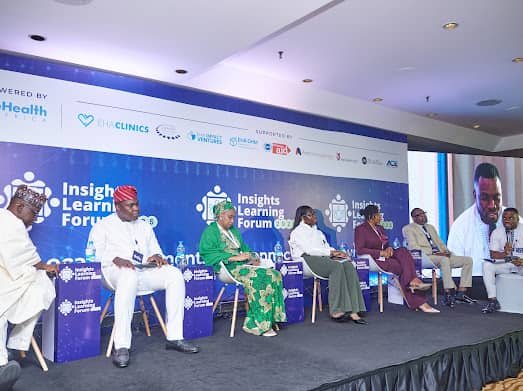At the 2025 edition of the Insights Learning Forum (ILF) in Abuja, health and policy experts called on governments to prioritise local partnerships, incentivise private sector innovators, and invest directly in digital health infrastructure at the primary healthcare (PHC) level.
The experts spoke on Wednesday during a panel session focused on building a thriving digital health ecosystem through local investment and partnerships.
The session, moderated by David Akpan, deputy director of Programmes and Partnerships at eHealth Africa, featured insights from Gafar Alawode, CEO Development Governance International; Amina Baloni, Former Commissioner for Health, Kaduna State; Ota Akhigbe, Director of Partnerships and Programmes, eHealth Africa; Akinyemi Atobatele, Principal Partner, Africa Hub for Innovation and Development; and Lauretta Akin-John, Vaccines Programme, Clinton Health Access Initiative, Nigeria.
Opening the discussion, Mrs Baloni, a former Commissioner for Health, Kaduna State, emphasised that any digital health solution must be designed with the realities of PHC infrastructure.
She warned that many developers design tools that cannot function in the real-world conditions of rural health centres.
She also noted that data fragmentation, lack of electricity, and poor connectivity remain core barriers to digital health adoption in underserved areas.

“At the PHC level, many facilities don’t even have electricity or internet. There’s a need for developers to create offline-friendly tools that can still function in low-resource settings,” she said.
She called for co-creation between tech developers, frontline health workers, and communities to ensure solutions actually meet the needs on the ground.
“The ecosystem at the PHC level must be understood. If your tool doesn’t speak to the daily challenges of health workers, it won’t work. We must come from a point of collaboration, not overregulation,” she added.
Mrs Baloni shared a case from her time in government where an attempt to introduce electronic medical records (EMR) at the PHC level hit a wall because of cost barriers.
She argued that the government must take the lead as a financial enabler, even when donor support exists, by offering tax incentives and embedding digital investments in health budgets.
“The solution provider asked for payment per patient annually, but PHCs provide free care. We had to look at using health insurance premiums or subsidies to bridge that gap,” she said.
She added that for startups to survive, the government needs to provide tax breaks or infrastructure support, and more innovators.
‘Why Nigeria needs institutions, not just infrastructure’
Mr Alawode, CEO Development Governance International, said Nigeria’s digital health ambitions are constrained by weak institutional structures especially at the state level.
He noted that without dedicated units for digital health within ministries, primary healthcare boards, and health insurance agencies, the country lacks a backbone to coordinate or scale innovation.
He described the current digital health space as fragmented, under-regulated, and dominated by private actors in the absence of clear government direction.
Mr Alawode said it was important to establish institutional frameworks and cross-sectoral collaboration involving health ministries, ICT agencies, and private stakeholders to define national and sub-national digital health priorities.
“We can’t just let the private sector bring random solutions. The government has to say: this is our problem and then ask for support as there’s no solution without a problem. Without that clarity, tech companies are solving problems no one has defined,” he said.
He also stressed the need for digital optimisation ensuring that tools are fit-for-purpose, cost-effective, and contextually relevant.
Responding to a follow-up question about whether Nigeria has the maturity and competence to coordinate digital health effectively, Mr Alawode said the issue wasn’t capacity but leadership.
“No one is born with competence. It’s acquired. In the health security space, Nigeria coordinated multiple sectors under one national plan. So yes, we are mature enough. We just need to replicate that kind of leadership across digital health.”
READ ALSO: FG disburses N20 billion to over 4,000 PHCs in Northern Nigeria
Reimagining partnerships
Speaking on leadership and long-term partnerships, Ms Akhigbe, director of Partnerships and Programmes, eHealth Africa, said effective digital health partnerships depend less on technical expertise and more on mindset.
Ms Akhigbe said Nigeria must move from competition to collaborative cooperation to unlock the full potential of local innovation while emphasising that strong partnerships begin with intentional leadership.
“It has to start from the leadership perspective, whether in government, donor organisations, or private firms. No one can do it alone. We need to come together to complement each other’s strengths.”
She stressed that partnerships should be rooted in long-term vision and not just short-term box-checking.
Read the full article here


